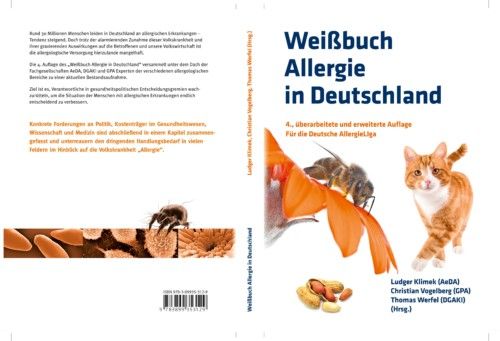DNB e.V. demands reimbursement of costs for basic care for neurodermatitis patients
The German Neurodermatitis Federation e.V. (DNB) calls for coverage of basic care for people with atopic dermatitis by statutory health insurers. “In a year, basic care costs about 1.500 euros that adolescent and adult patients unfairly have to pay out of their own pockets,” explains the 1. Chairwoman of the German Neurodermatitis Federation e.V. Thomas Schwennesen from Hamburg.
German Neurodermatitis Federation e.V. (DNB) launches online petition
Professor Dr. Thomas Werfel, who works with these patients on a daily basis in his day-to-day job as Deputy Clinic Director of the Hanover Medical School, Clinic for Dermatology, Allergology and Venereology, supports the petition as Chairman of the German Allergy League e.V. This initiative and appeals to all patients and their relatives to support the petition under change.org/neurodermatitis to sign on to add emphasis to the request.
Professor Werfel, who is also President of the German Society for Allergology and Clinical Immunology (DGAKI) and a member of the board of the German Dermatological Society (DDG), adds: “Neurodermatitis has increased significantly over the last 30 years and is the most common chronic disease in childhood and adolescence. It puts a massive strain on young patients and their families, but also on many adults, and is associated with a high level of suffering for those affected – both physically and psychologically.”
From a medical point of view, it is incomprehensible that the health insurance companies do not cover the costs. “In the guideline for neurodermatitis therapy, which we jointly developed on behalf of scientific specialist societies in dermatology, pediatrics and allergology, the cost-intensive basic care is defined as a causal therapy and thus, in our view, belongs in the benefits catalog of the statutory health insurance funds,” says Professor Werfel.
What is neurodermatitis?
neurodermatitis is a non-contagious, inflammatory disease of the skin. It is characterized by eczema, sometimes extreme itching and dry skin, and can promote bronchial asthma, hay fever and food allergies.
“With neurodermatitis, a real vicious circle of itching, scratching and renewed itching can develop. Frequent consequences are sometimes painful and sometimes dangerous infections,” adds Schwennesen. The cause is an increased permeability of the skin, which then weakens its defense function against allergens and environmental influences.
A daily basic therapy with moisturizing creams or ointments is therefore an indispensable pillar of the therapy and should be part of the routine in the everyday life of people with neurodermatitis. The daily application of creams or ointments free of active ingredients and preservatives can significantly alleviate the symptoms and contributes significantly to the stabilization of the skin condition.
However, the statutory health insurance funds only cover the costs for children up to the age of twelve. Professor Werfel, co-editor of the recently reissued “White Paper on Allergy in Germany”, believes that politicians have a responsibility to take action. “Neurodermatitis patients carry a heavy burden, suffer massively from the itching of the disease and not infrequently feel stigmatized.
Therefore we direct an urgent appeal to Federal Minister of Health Jens Spahn to use itself for the fact that over the common federal committee medicines for the basic care are again taken up to the benefit catalog of the legal health insurance (GKV), as that was the case up to the entry into force of the GKV modernization law in the year 2004.
Better informing with a neurodermatitis training course
Werfel also calls for better information for those affected and points to the structured neurodermatitis training according to the AGNES e.V. concept, the costs of which are generally covered by the statutory health insurance funds, and whose centers can be found at www.neurodermatitis training.de can be found.
Many of those affected are not sufficiently aware of the trigger factors that can contribute to skin aggravation, such as irritants, certain allergens or hormones. The spectrum of treatments to be prescribed by doctors, which should always be carried out in combination with basic therapy, are also not known to all those affected, despite the long course of the disease.
These include antipruritic medications, externally applied anti-inflammatory therapeutics and, in very severe cases, internal medications such as the recently approved antibody Dupilumab, which specifically intervenes in the allergic inflammation. In addition, several studies had shown that allergen-specific immunotherapy – also known as hyposensitization or allergy vaccination – can improve atopic dermatitis in addition to allergic hay fever or mild bronchial asthma.
About the German Allergy League.V.
The Allergy League e.V. (DAL) wants to sensitize people in Germany to the early recognition of allergic diseases and their rational diagnosis and sustainable treatment. Furthermore, she also advocates patient training and the assumption of costs for anti-allergic drugs by health insurance companies.
Their working basis is the „White Paper Allergy in Germany“. The comprehensive work describes the current state of research in allergology in Germany. The DAL is an initiative of the Association of German Allergists (AeDA) and the German Society for Allergology and Clinical Immunology (DGAKI).
White paper allergy in Germany, Springer medicine publishing house GmbH, revised and extended edition. ISBN 978-3-89935-312-9, ISBN 978-3-89935-313-6 (eBook), Price: 39,99 Euro.
